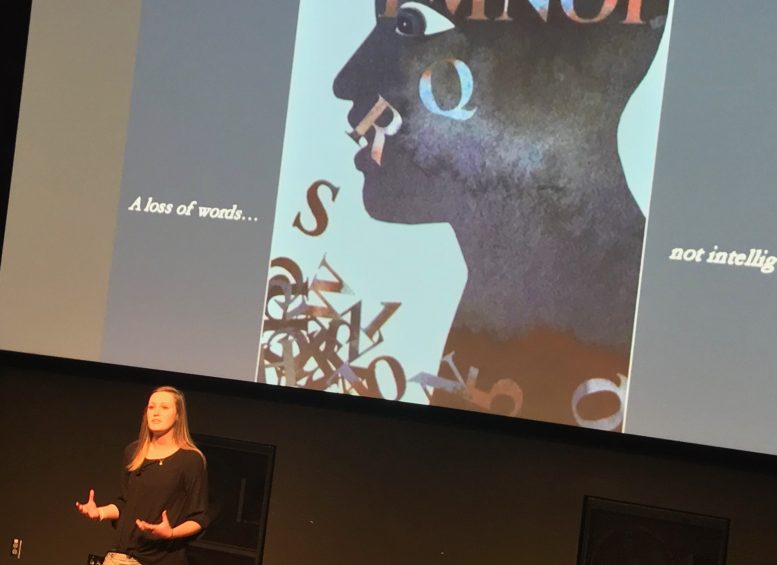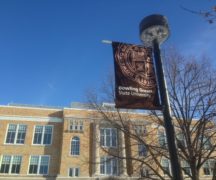By DAVID DUPONT
BG Independent News
And the winner of the first Three-Minute Thesis competition at Bowling Green State University is … Kacie Pummill, a graduate student is Speech-Language Pathology.
Pummill is studying how to help people suffering from speech disorders make themselves understood.
The competition is aimed at helping graduate students make their own research, often on arcane topics, understandable to the general public.
Coming away from the recent Three-Minute Thesis Competition, it was hard not to feel both a little bit smarter, and more than a little bit humble, because the knowledge on display.
Seventeen graduate students presented three-minute presentations on some aspect of their research. An “elevator speech” is the term used by Dean of the Graduate College Peggy Booth.
The topics covered ranged from the intricacies of computer science to Star Wars.
The second contestant, Kevin Oyale Chiteri from biological sciences presented on : “Functional Analysis of Arabidopsis thaliana Organic Cation Transporters (OCT5 & OCT 1) genes in Polyamine Transport in Plants.”
Deep work to be sure.
Not all topics were as daunting. Aju James, from American Culture Studies, talked about the role of stand-up comedy in developing an urban community in Mumbai.
Regardless of the topic, each contestant could only use one slide and three minutes. No props, no poems, no costumes, no song and dance, and no rap. Just spoken word. A “compelling oration,” Booth said, that challenges student to communicate their research ideas and highlight their significance for a non-specialist audience. And, she noted, “it’s fun.”
The rules, Booth explained, are set by the University of Queensland, the originator of the competition.The Australian institution introduced the Three-Minute Thesis concept 10 years ago, and it proved so popular that the school trademarked it. Now 600 universities around the world host competitions with BGSU being one of the newest additions.
Pummill, who comes from Chillicothe, said she didn’t expect to win. “I just wanted to do this for myself and develop an elevator pitch and get to know my research in a way that I can explain it to my family members, relatives, and friends who aren’t in my field.”
Pummill, who got her bachelor’s degree from Ohio University, said she was attracted to studying speech and language pathology because “I really have a passion to help people.”
She wanted to go into a medical field “but I’m not good with blood so nursing or medical school was not an option.”
Given her interest and skill in languages and linguistics, this seemed a good match.
A short discussion about aphasia, a speech disorder often caused by strokes, in one of her BGSU classes started her thinking about what would become her thesis topic. Someone suffering from aphasia often has trouble finding the right word, or substitutes another similar sounding word — “camel” for “camera,” for instance — for the one they want.
“A lot of therapy focuses more on treatment for people with aphasia and ameliorating the effects with that person,” Pummill said, ” but I wanted to do the flip side.” So Pummill looked at the variety of speech errors and their severity.
She started by putting the audience in the place of someone with aphasia.
“Every sentence you make is a laborious puzzle that many people won’t have the patience to piece together, and even when you do speak you realize that many of your words are incorrect or omitted completely,” she said. “Just imagine ordering at a restaurant and the feeling of embarrassment not remembering the words for ‘fries.’ Imagine not being able to say ‘I love you.’ This is aphasia.”
She had 219 students listen to passages that emulated the errors made by someone with aphasia.
What Pummill found surprised her. “You’d think the severity of the errors would lower comprehension. That wasn’t the case.”
The speech was understood or misunderstood at the same frequency no matter the type of error or their severity.
That provides “preliminary support” that speech therapy for aphasia patients should include “the use of context clues, facial expression, and hand gestures” to help patients convey their meaning “when their words fail them.”
This, she said, takes some of the burden off the patient, and makes it easier for others to understand them.
In addition to winning the $300 first prize, Pummill will have the chance to compete at the Midwest Association of Graduate Schools Three Minute Thesis Competition in St. Louis. The trip will be paid for by the Graduate College.
The competition was judged by a six-member panel of faculty and administrators.
Second place, $200, went to Samantha Nesnidol, Industrial-Organizational Psychology, whose topic was: “Why Does the Public Sector Resist Unproctored Internet Testing?”
Third place, $100, went to Emily Ferrell, Clinical Psychology, whose topic was: “Risk Factors for Disordered Eating Behaviors among Military Personnel.”
Those attending also had the chance to vote on People’s Choice Award. Brian Timm, Sociology, received the $25 prize. His topic was: “The Long Reach of Delinquent Networks in Late Adolescence on Criminal Activity in Early Adulthood.”
Booth said afterward that she felt the inaugural event went well, though some adjustments in its promotion need to be made. In particular, she’d like to see more entries from across the university.
Of those who competed, 16 came from the College of Arts and Sciences. The lone exception was from the College of Health and Human Services. That was Pummill, the winner.




